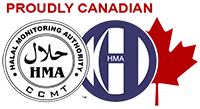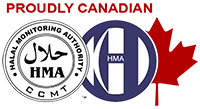About HMA


Welcome to Halal Monitoring Authority (HMA)
For many years, Imams and Ulama across Canada recognized the need for a clear, consistent, and trustworthy Halal oversight system that could serve the growing Muslim community and the rapidly expanding Halal industry. In March 2004, the Jami’yyatul Ulama Canada (CCMT), a federally registered non-profit organization, took the initiative to better understand the landscape of Halal production and distribution in the country. A dedicated team was appointed to visit facilities across the sector, including poultry and meat abattoirs, further-processing plants, and various manufacturers and retailers.
Through this extensive review, it became evident that the community would benefit from a unified, transparent, and professionally managed Halal certification framework. Recognizing this need, the CCMT determined that establishing a centralized body with clear procedures and consistent monitoring was essential for supporting both consumers and industry stakeholders.
To fulfill this vision, the CCMT formed a steering committee tasked with creating a reliable, standardized certification and verification system that reflects the highest Shariah principles. This initiative led to the establishment of what is now known as the Halal Monitoring Authority (HMA Canada)—an organization dedicated to ensuring integrity in Halal production, supporting industry partners, and serving the Muslim community across Canada with confidence and clarity.
Problems in the Industry
Serious issues were found across the industry, including incorrect slaughter practices, contamination risks, mechanical violations, unverified imported meat, and non-halal ingredients in processed products.
Some of the many problems we discovered during our inspections were: Slaughter men at abattoirs not reciting the Tasmiyah during the slaughter . Recitation of the name of Allah at the time of slaughter is a condition for the animal to be Halal. However this condition was not being fulfilled by majority of the slaughter men we had interviewed. Instead they were either; chewing gum during the slaughter talking to their co-workers simply not reciting the tasmiyah because they were unaware of its importance reciting the tasmiyah only once at the beginning of the slaughter thinking that it is sufficient for the entire kill reciting the tasmiyah only upon one bird in every ten Non-Muslims slaughtering at various abattoirs, rendering the meat Haram. Minimum amount of required veins not cut resulting in the animal being Haram. There are four arteries within the animal that are designated to be cut at the time of slaughter
1) The Throat
2) The Oesophagus
3) The two Jugular Veins.
Unfortunately, many slaughter men pay no attention towards which arteries and how many of them are being cut during the slaughter due to either sheer ignorance or the speed of the line being too fast. Unmonitored stunning methods prior to slaughter. There are many types of stunning techniques: The captive bolt pistol (used for cows/cattle). Electric stunning (used for sheep). Electrified water bath (used for poultry). According to the Ulama (religious scholars) stunning which causes death prior to slaughter is not accepted in Islam. Usage of rotating mechanical blades for slaughter which does not serve the requirements of Halal slaughter.
The appointed inspection team also discovered that large amounts of meat were imported from foreign countries. Local plants cannot guarantee the meat that had been imported was slaughtered in accordance to halal guidelines. NON-PROTEIN The following are some of the problems discovered in non meat products: non halal ingredients used without being declared use of machinery and procedures that do not comply with halal requirements packaging made from non halal substances In short, these and many other issues had to be addressed and therefore the HMA was formed.
The team found in a renowned poultry abattoir that rotating mechanical blades were being used to slaughter the birds. A slaughter man would recite bismillah when switching on the machinery and would then go stand by the blade and recite bismillah at his own pace. By the time he would complete one recital at least ten chickens had passed by on the line (the speed of the line was 200 chickens per minute) Contamination issue. (mixing of halal with non-halal). The team also discovered poultry being processed on un-sanitized lines thus causing non zabiha leftovers to be mixed with the zabiha meat on the machinery. Retailers do not know if they are being cheated. The team found that various retail and butcher store owners could not verify if the meat that is supplied to them is genuine halal. They stated that they merely take the word of the suppliers and it can be possible that they are cheated in believing that the products supplied to them are halal. Meat coming from abroad.

